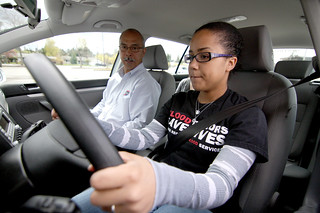
isn’t required for state driving tests.
(Photo: Joint Base Lewis McChord)
Nonprofits that support road safety are backing a November ballot issue that would allow people who came to Oregon illegally to once again take driving tests and buy car insurance.
A public “yes” vote on Measure 88 would let undocumented Oregon residents get “driver’s cards” that let them drive legally, essentially restoring the system that was in place before 2007.
It’s not clear how many Oregon residents are now driving despite not having legal immigration status or licenses, but the number is almost certainly in the many thousands.
“People, when given the option to do the right thing, they will do it… they want to drive legally and safely.”
— Reyna Lopez, Causa
“This will promote safety on the road for everyone, regardless of how they choose to get around,” wrote Gerik Kransky, the Bicycle Transportation Alliance‘s advocacy director, in an email.
Measure 88 would “make sure that every single person who’s operating an automobile on our streets has had an opportunity to take a test at the DMV,” said Aaron Brown, president of Oregon Walks.
Kransky said in a phone call last week that the BTA’s board had agreed to endorse the ballot measure, joining Oregon Walks and the public transit advocates OPAL Environmental Justice Oregon in doing so.
“To think that somebody who’s illegally here is all of a sudden going to get religion and start obeying laws when they get a driver’s license is sort of ridiculous. They think they’re above the law.”
— Jim Ludwick, Oregonians for Immigration Reform
In every U.S. state, it’s a criminal offense to drive without both a license and basic car insurance. But insurers don’t typically sell policies to people who can’t prove that they’ve passed a driving test — and under current law, Oregon doesn’t conduct driving tests on people who lack a legal immigration status.
Reyna Lopez, the director of civic engagement for Latino immigrants’ advocacy group Causa, said that about 80,000 undocumented Oregon residents held driver’s licenses in 2007, when then-Gov. Ted Kulongoski used an executive order to block the state from issuing licenses to anyone without a legal status.
Many of those 80,000 people have continued driving using their old licenses, but one by one they’ve been expiring.
Advertisement
Lopez said that in her work, “from Hermiston, Oregon, to Medford, Oregon, the first thing that families ask me is what is happening with the license.”
“People, when given the option to do the right thing, they will do it,” Lopez went on. “Everywhere we’ve gone, people have said they want the option to do the driver card. They want to drive legally and safely.”
Jim Ludwick, communications director for Oregonians for Immigration Reform and an opponent of illegal immigration and Measure 88, said in an interview that he doesn’t believe people who crossed a border illegally want to drive legally.
“To think that somebody who’s illegally here is all of a sudden going to get religion and start obeying laws when they get a driver’s license is sort of ridiculous,” Ludwick said. “They think they’re above the law. … I don’t pick and choose which laws to obey. Why do illegal aliens get to?”
Ludwick also said a car license is not always required to purchase car insurance. However, he said he wasn’t sure which companies are willing to insure unlicensed drivers.
If Measure 88 passes, undocumented residents who can prove they’ve lived in Oregon for at least one year would be able to get a “driver’s card” in the same way any new resident or driver would: by passing a written test if they have a valid license in another U.S. state, or by passing both written test and a behind-the-wheel test if they don’t have a valid license.
Washington and California are both among the U.S. states that allow undocumented immigrants to be legal drivers. Some people who work in the Portland area get licenses in Clark County in order to have one on the Oregon side of the Columbia River.
Brown, who serves as the volunteer president of the Oregon Walks board and is also actively working on the Measure 88 campaign in his day job as organizing coordinator for the Bus Project, said he sees support for Measure 88 as a chance to make Portland transportation activism less “astonishingly monocrhomatic.”
“This isn’t just about sharrows and bikes and a very narrow understanding of how transportation matters,” Brown said. “This is about getting to work on time, getting kids to school, getting family members to the doctor.”
You can read more about the case for and against Measure 88 at Vote Yes on 88 and Protect Oregon Driver Licenses.


